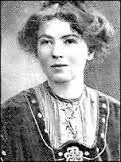While watching the new film Suffragette, I noticed one aspect of detention the British Suffragettes faced 100 years ago that was similar to what Guantanamo prisoners face today. And that is, force-feeding.
A shocking scene in Suffragette reveals the alarming reality of shoving a rubber tube up the nose to force-feed women incarcerated in London’s infamous Holloway prison. One hundred years later, an eerily similar performance shows the step by step force-feeding of a prisoner at Gitmo – if you can bear to watch, see the four minute video on Youtube: https://www.youtube.com/watch?v=z6ACE-BBPRs
The force-feeding video about Guantanamo is worth watching because it almost ‘normalizes’ the punishment of the feminists 100 years ago– merely for agitating for the right to vote. Today women have the vote, but we can’t vote to close Gitmo, or other prisons and ‘black hole sites’ created by the US and their NATO allies’ relentless “war on terror”. There are 120 prisoners still serving hard time in Guantanamo; 44 who are being force-fed.
In the early years of the 20th century, hundreds of Suffragettes were force-fed when they refused food to protest their incarceration. And go to jail they did: for protesting, for marching, and for petitioning. Eventually, to get the powerful to pay attention to them, they threw rocks and bombed letterboxes. British women finally won the right to vote in 1928 – 10 years after Canadian women had won it.
Members of the Women’s Social and Political Union (WSPU) included leading Suffragette Emmeline Pankhurst, her adult daughters Sylvia and Christabel, women lawyers (who were prevented from practicing law due to their sex) and factory women. They all suffered injuries and sickness due to force-feeding and their brutal prison sentences. In 1913, the British government passed the Temporary Discharge for Ill Health Act known as the “Cat and Mouse Act”. Under this law, imprisoned Suffragettes who became too weak, sick or beaten to remain in prison were released. After their health improved they were re-arrested and jailed again – for a longer sentence.
Suffragette, is a clear portrayal of the politics and the times at the tail end of Britain’s industrial revolution. Aside from working as servants to the wealthy (portrayed in Downton Abbey), sweat shops and laundries were among the only places working-class women could find jobs. These workplaces were rife with hazards that could lead to catastrophic accidents on the shop floor and rape by the supervisors and owners in the upstairs offices.
Viewers are swept into the midst of the male politicians’ and police rage at the women who dare to stand up. What is refreshing about the film is that there is no male protagonist on equal billing with the heroines of the film. Quite deliberately the filmmakers make sure that there is no man who deserves our respect, or our admiration. There is no romantic love interest. In Suffragette the men resort to bullying, violence and even extortion to discourage their wives from taking political action. The lead police detective, who uses his status and power to crush the women, is a wholly unsympathetic and grotesque figure. At one point, after he makes a mild comment to his boss about the ‘barbarity’ of forced-feeding, he immediately yanks himself back into line.
Some have faulted the film for being too “white” and too focused on middle-class women. Agreed, but I think Suffragette is a lively and exciting film about the need for social activism. I’ll bet the film has a profound effect on most women filmgoers—at least it did for me. Some of us remember back to the arrests and the police tactics during the Viet Nam protests of the 60s and 70s; the arrests and violence done to the marginalized, the blacks and the Aboriginal people in this country almost daily; we remember the mass incarceration of more than 1,000 Torontonians who peacefully protested the G20 Summit in Toronto just five years ago. We understand how Bill C-51 will further criminalize dissent. Knowing what we know and what we can see into the future, many of us see the importance of women continuing the fight which started more than 100 years ago.
Judy Haiven teaches in the Management Dept at the Sobey's School of Business at Saint Mary's University. She is chair of the CCPA-NS.
.



